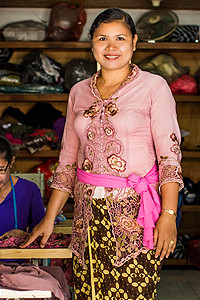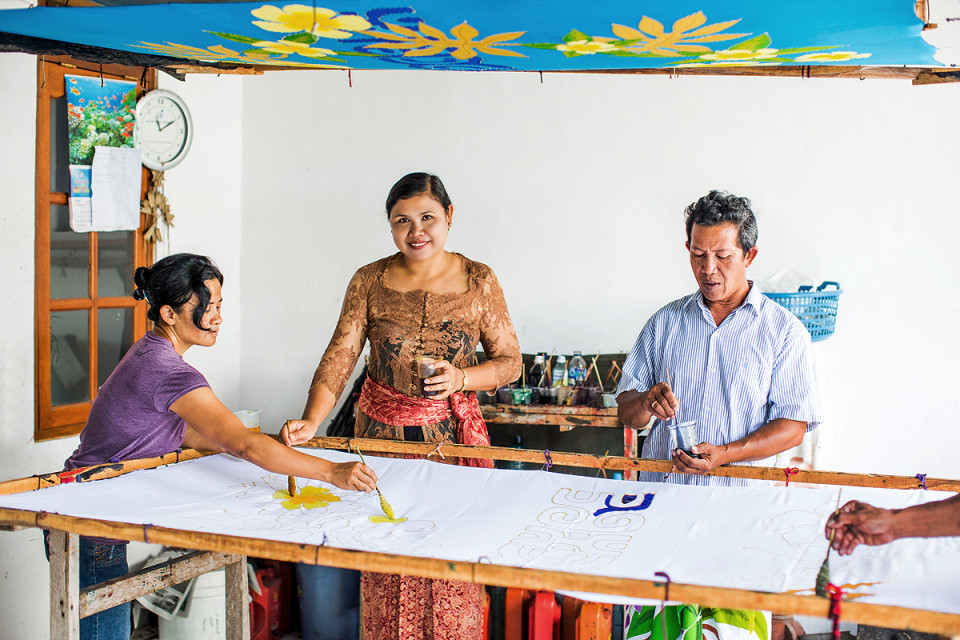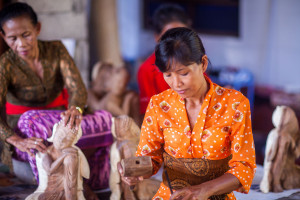Desak Nyoman Parwati, Balinese Businesswoman, on Brilliant Batik, Self-Respect, and The Helping Hand of California-Based NOVICA
For those of us who throughout the years have supplemented our sensible wardrobe choices with unique, lovely pieces that have a hippie-chic vibe to them (think of the latter-day, more mature Sienna Miller), it is likely a mystery to us how the multi-hued brilliance of a batik scarf comes about. When its gorgeous tint catches our eye, and we think the saffron yellow color would add just that hint of bohemian allure to a grey cashmere sweater, it is probable that more than once we peer at it, wondering, how on earth do they make this pattern? Is it created by hand? Does it come from some exotic country?
Someone who can answer those questions: Desak Nyoman Parwati, a Balinese artisan designer featured by NOVICA, a Santa Monica-based business that partners with National Geographic to offer indigenous artisans a global marketplace. Over the past fifteen years, she has created many batik products for Novica — whose avowed mission is to “Spread Happiness” — including richly-colored, silky robes.
Parwati says that being able to offer her products to the California-based online marketplace allows her to, in her words, “achieve the dream I had years ago when I envisioned where I wanted to be now.” She notes movingly that it has given her a feeling of success, which she defines as “knowing that my children will have a great future and that I’m building something that is for my family.”
This is exactly the end result the founders of Novica, Roberto Milk and Armenia Nercessian, hoped for when, in 1999, they created a free “digital shop window” for thousands of creative, industrious workers across the planet. Since then, Novica has been an invaluable conduit that has generated over $60 million for individuals who might otherwise be relegated to local, low-paying jobs. It also provides micro-loans, has a Keeper of the Arts program tailored to maintaining ancient artisan traditions, and lets its artisans have control over their products: they can lower their prices, remove items, or put them on sale.
Read more below on how Parwati found her way to this richly enjoyable path to creative expression and self-sufficiency.

Name: Desak Nyoman Parwati
Title: Owner/Designer
Company: Nyoman Collection
Location: Ubud, Bali, Indonesia
Age: 43
Family: Married, with three children ages 16, 14 and 6
Can you tell the readers a little bit about yourself? My name is Desak Nyoman Parwati; most people call me Parwati. I was born in Gianyar, Bali, in 1972. I come from a large family, with four brothers and four sisters. My father was a farmer, which was customary for his generation. My mother, however, was the businesswoman of the family.
She sold cakes in the local market which she made at home. She created them using the traditional process of making her own flour and then cooking them in a wood-fire oven. Most of the older children helped to make the cakes; it was a real family business, but we didn’t know it at the time — it was just what we did! I helped to pack the cakes so my mother could take them to the market every two days.
When did you decide you wanted to start a business? My father passed away when I was fifteen, and I had to stop my schooling and start working for someone else to help make money for my family.
So I started working for another woman here in Bali who was making garments. I learned everything I could by watching and listening. I worked there for eleven years, and then I got married. When I had my first child, I was able to work at home making patterns for the same company. It was great to continue to work and take care of my son, but it wasn’t enough for me. I had the idea then that I wanted to do something more for myself.
How did you start your business? I talked with the woman for whom I was working, and told her what my plans were. She was very encouraging, so I decided to do it. I started my own business in 2000.
My brother and I partnered together to get it going. We started a small workshop with just two sewing machines on a small piece of land that we rented. My younger sisters and cousins became the first tailors. So many people helped me! Some people made donations of money, others donated fabric. I took all the help I could get; I knew I could not do it alone. A close friend gave me my first order, and we are still making batik for them today.
How did you handle finances? What was your start-up budget? (Laughs) we didn’t have a start-up budget. We just had whatever we could get. I sold my motorbike and my brother sold his motorbike — that was our start-up fund! We just did whatever we had to do to make it.
What inspires your work? I’m inspired every day – simply because it’s mine, it’s my own business. I’m building something for the next generation, for my children. I have twenty people working here, so I need to make sure they continue to have jobs and they can continue to provide for their own families. I love what I do, and it’s something new every day. My children are able to go to school and focus on their studies. And one day they will take over the business.
Do you have any mentors or heroes who inspire you? The woman I worked for starting in 1989, Desak Nyoman Niti, taught me so much. She taught me how to be a manager, how to be organized, how to run a business. I learned the skills of making clothing from her as well as the business side of things. That was so important. She is like my sister and has always been a mentor to me.
How does your culture/background influence your work? We make batik, which is a traditional fabric-dyeing technique in Indonesia. It’s complicated, and only very skilled people can do it. There are some batik patterns that only a few people can make, so it’s very specialized. It’s also dependent on the weather — so Mother Nature definitely has her say in the outcome of the final product! All of our clothing and accessories use this traditional handmade batik process, so for me all of our clothing has a cultural influence.
What has been your biggest challenge so far with your business? Keeping the quality up to our high standards. The fabric quality, batik colors and designs and the sewing. It’s a challenge when something changes or a supply changes. It can make a big difference in the final outcome so we constantly need to work to keep everything at a high level.
What has been your greatest accomplishment? The fact that I have been able to sustain my business for fifteen years. There have been many ups and downs, and the economy was very low here for a period of time but we’ve been able to continue to grow each year.
What do you like best about your job? Most of the people who work here have been with us since the beginning, so they’ve been part of this family for fifteen years. The others have been here at least eight or ten years. So I like that I can offer good jobs, especially to women. Most of our staff are women; only a few men who process the batik. I prefer to work with women; they are hardworking, organized, dedicated and responsible. Some of the women work here, in the workshop, and others can work at home so they can take care of their families. We have all grown together over the last fifteen years. We’ve seen so many babies born, marriages, kids growing up; it’s really the best part of my job.
What do you believe are the major culture differences when doing business around the world? There are only small differences in the way that other cultures do business. Once you start working with people from another country, you learn how to speak to them, what they like, what is important to them. There are more similarities in all cultures than there are differences.
What advice would you give to young women starting a business? Know what you want, and how to do every part of your business. It’s hard, but learning to do each and every step of your business will give you the confidence to make decisions and make the best choices. You can see when something is not being done right; you can see when there is a problem if you know how to do everything. You can easily train others to do those parts of the business, but you need to know how to do them yourself. You need to be able to step in and help when and where it’s needed. I can do every part of my business, from pattern-making, sewing, quality control, and batik painting, to accounting and communicating with customers — all of it, and that makes my management of the company much easier.
What does success mean for you? It means I’ve achieved the dream I had years ago when I envisioned where I wanted to be now. I am doing what I set out to do and haven’t looked back. I’m able to have a business and spend time with my family. Success is also knowing that my children will have a great future and that I’m building something that is for my family.
How do you see your company developing in the next 3-5 years? We’ll continue to grow and reach new customers, create new designs and increase our sales. That way, we can continue to offer more jobs to women in the area. That’s an important point for me.
23TAGS: NOVICA
 Effective Communication
Effective Communication Women Making History
Women Making History Grants & Funding Sources
Grants & Funding Sources Interview Prep
Interview Prep Impactful Leadership
Impactful Leadership Dressing for Work
Dressing for Work Dressing for Your Style
Dressing for Your Style Interview Style Tips
Interview Style Tips Women's Stocking Stuffers
Women's Stocking Stuffers Gift the Busy Traveler
Gift the Busy Traveler Airport Layover Activities
Airport Layover Activities Traveling & Eating Healthy
Traveling & Eating Healthy Travel Like a Boss Lady
Travel Like a Boss Lady The Dual California Life
The Dual California Life Gifts for Thanksgiving
Gifts for Thanksgiving Summer Reading List
Summer Reading List Top Leisurely Reads
Top Leisurely Reads New Year, New Books
New Year, New Books Life Lessons from a Sitcom
Life Lessons from a Sitcom Oprah, Amy or Amal?
Oprah, Amy or Amal?







